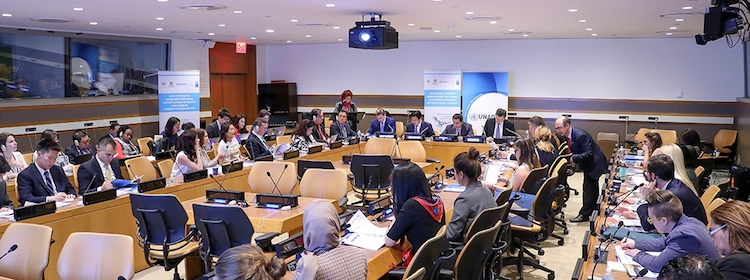By Santo D. Banerjee
UNITED NATIONS (IDN) – Educating younger generations on global citizenship through intercultural literacy is a serious civic educational and moral issue, said Nassir Abdulaziz Al-Nasser, High Representative of the United Nations Alliance of Civilizations (UNAOC) in his opening remarks at an event co-organized with the United Nations Academic Impact (UNAI) member institution Al Farabi Kzakh National University (KazNU) with the support of the Permanent Mission of Kazakhstan to the UN in New York.
Introducing Abu Nasr Mohammed Al-Farabi, after whom the UNAI member institution in Kazakhstan is named, Al-Nasser said Al-Farabi is known as a bridge builder between classical Occidental civilization and the Islamic civilization. His influence and teachings in the Arab world have closed many gaps and eliminated many misunderstandings between the two civilizations.
After his death, and through the Middle Ages, Al-Farabi’s teachings influenced the minds of Arab leaders throughout the Muslim world both on the meaning of Life and on the future of Mankind. His teachings and influence have therefore contributed to a genuine philosophical rapprochement and mutual understanding between civilizations, which lasted until Modern times, Al-Nasser explained.
“What we have to retain is that over the centuries his work has symbolized the most valued humanistic qualities of love, tolerance, understanding and respect of the other no matter what belief or color,” the UNAOC High Representative said.
“Knowledge without upbringing, without a moral beginning, can bring harm, not good.” This quote from the great philosopher Al-Farabi is the essence on which Global Citizenship Education Programs all over the world can lean on, Al-Nasser added.
The role of institutions of higher education and the new approaches required to build bridges between cultures were key aspects of the discussion, which served as a platform for panellists and guests to discuss ways to promote cross-cultural exchanges at the university level in order to engage younger generations on global citizenship and on the realization of the 2030 Agenda for Sustainable Development.
Al-Nasser highlighted that education “is important in providing the skills, knowledge, attitudes and values to individuals to understand interdependence, inequalities, and exclusion in the dynamic world, and commits to transform the world to achieve greater justice, equity, and human rights for all.” Nations “must recognize the need for more inclusive education about the world and its people”, he added.
Kazakhstan’s Permanent Representative to the UN, Ambassador Kairat Umarov, said that “the diversity of the world offers many lessons to young generations” but education must play a role. “In light of the numerous problems of today and if we want to solve them collectively, we have to learn how to be global citizens together,” stressed Ambassador Umarov. “I call for the young generations to be active in fulfilling their future roles as leaders of this planet,” he concluded.
KazNU rector Professor Galym Mutanov emphasized that “universities of the world should unite to develop concrete steps to educate youth in the spirit of humanistic values, which is in line with the goals of the United Nations.” This is the experience and initiatives of KazNU, he added.
Professor Mutanov also showcased a new model of university development based on ideas of the philosopher Al-Farabi that were anchored in the notion of a “virtuous society”. According to him, “the mission of the modern university includes the formation of young people as virtuous citizens of the world with high spiritual and moral qualities and an active civil position, something especially relevant in the context of globalization and the rapid development of new technologies.”
UNAI representative Omar Hernández observed that the “commitment to encouraging global citizenship through education” is of vital importance to UNAI. “We need global citizens to address global issues, but we also need to think and to act globally, while at the same time rethinking how we understand education to prepare young people to deal with today’s interconnected world.”
UNAI member institutions were responding to this need by organizing and implementing a range of activities and initiatives, as reported by them on an annual basis, Hernández added.
Other speakers at the event included: representatives of the Kazakh Scientific Institute for Cultural Research and Turkey’s Permanent Mission to the UN; the Assistant General Secretary for United Nations and International Affairs of the United Methodist Church, Liberato Bautista; the Executive Director of ARTE – Youth Development and Human Rights through Education, Marissa Gutierrez-Vicario; and Professor Rafal Szczurwoski from the City University of New York (CUNY).
This article is based on a UNAI report on May 25 on the event held on May 2, 2018 at the UN Headquarters in New York. [IDN-InDepthNews – 27 May 2018]
Photo: UNAOC High Representative Al-Nasser addressing the event at the UN Headquarters in New York on May 2, 2018, co-organized with the UNAI and the Kazakh Permanent Mission to the UN. Credit: UNAOC.
IDN is flagship agency of the International Press Syndicate.
facebook.com/IDN.GoingDeeper – twitter.com/InDepthNews

